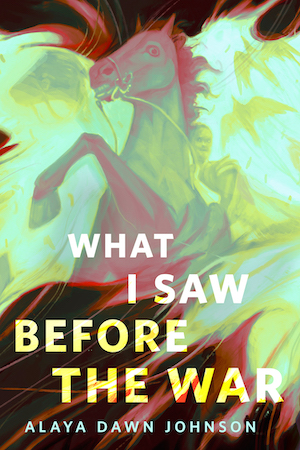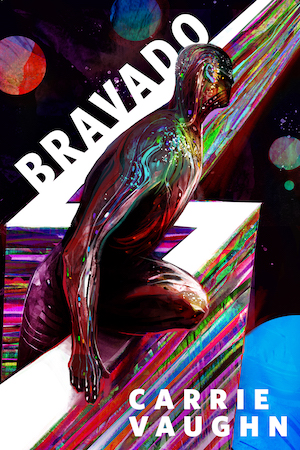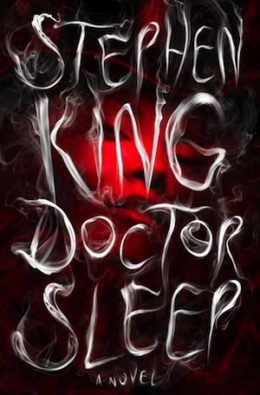STEPHEN KING: I am going to write a book.
PUBLISHER: Hooray!
STEPHEN KING: It will be a sequel to The Shining, and Carrie will be in it.
PUBLISHER: But HawtRoland1208 already did that on KingFanFictionForum.net.
STEPHEN KING: It will have vampires.
PUBLISHER: Vampires are sexy.
STEPHEN KING: My vampires will be old and drive R/Vs and torture children to death.
PUBLISHER: You look tired. Are you tired? Maybe you should skip the book and take a beach vacation instead.
Fact: Stephen King once ran over a leprechaun and it cursed him so that if he ever stops typing, he dies. Since 11/22/63 thudded onto bookstore shelves in 2011 he’s published a play, two novels, reissued a previous novel, cranked out two collaborative novellas, and one Kindle Single. He wrote that one in his sleep. Earlier this year he also published the novel Joyland about a haunted amusement park but let’s face it, Joyland cannot be a serious King book because it is less than 5,000,000 pages long and sounds like a repurposed spec script he once wrote for Scooby Doo.
So, with lots of qualifying phrases, Doctor Sleep is the “first” “new” “Stephen King book” in a “very long time.” A sequel to one of his most iconic books (The Shining) written 36 years (and 51 novels—he’s pretty scared of that leprechaun) ago, when it came out the most recent project that had King’s name on it was the TV series Under the Dome so anything short of being hit in the back of the head with a sock full of pennies probably sounded like a win to his readers. And let’s be clear, reading Doctor Sleep is way better than getting hit in the back of the head with a sock full of pennies. For one thing, you don’t lie on the ground in a stupor afterwards while a thief goes through your pockets. For another, Doctor Sleep doesn’t suck and, for a sequel to one of the most beloved horror novels of all time, that in itself is kind of a miracle.
In interviews, King has speculated on what would happen if Danny Torrance, the psychic kid from The Shining, grew up and married Carrie White, the psychic teenager in Carrie (no mention was made of The Dead Zone’s Johnny Smith becoming their wacky landlord, or Firestarter’s Charlie McGee being their kooky roommate—but the potential for a psychic version of Three’s Company is clearly there). King’s Carrie White is 11 years older than Danny Torrance so there’s a bit of an age gap to overcome on top of everything else, but you can tell it’s the kind of high concept idea that King couldn’t let go of and in Doctor Sleep he actually pulls it off without the creepiness you might normally feel when a 66 year-old-man tells you that two of his imaginary playmates are getting married.
King has always been more than a little obsessed with the idea of reworking The Shining. Did you know he hated the Stanley Kubrick film? You did? That’s because he won’t shut up about it. You can imagine him jumping up and down and shouting “Whooppee!” when he realized that the Author’s Note at the end of Doctor Sleep would provide him with yet another forum to slag off Kubrick’s now-classic film. He even took his own stab at redoing it himself, working with director Mick Garris and writing a 1997 The Shining TV miniseries starring Steven “Wings” Weber and Rebecca “The Hand That Rocks the Cradle” De Mornay. How was it? It ended with the proud ghost of Jack Torrance attending his son’s high school graduation, so there’s that. Even King seems a bit embarrassed about how his version turned out because in Doctor Sleep he retcons it out of existence, making sure we know that Jack Torrance never attended Alcoholics Anonymous, whereas in his Shining miniseries Jack got his job at the Overlook Hotel thanks to his AA sponsor.
It might feel weird to talk about continuity in a novelist’s body of work, but King loves stitching his fictional worlds together, like a kid making his GI Joes join the Star Wars guys to fight the Smurfs. In Doctor Sleep there’re shout outs to Jerusalem’s Lot (setting of ‘Salem’s Lot) and another to Castle Rock, King’s favorite fictional town. There’s even a mention of Charlie Manx, the bad guy from his son, Joe Hill’s, recent book, NOS4A2, and a car sporting a bumper sticker for that book’s Christmasland. But most of the connections to previous books are to The Shining, and to poor little Danny Torrance.
All grown up, the fresh-faced five-year-old of King’s 1977 book is now a 40-year-old alcoholic struggling to stay sober, the kind of guy who cleaned out the wallet of his one-night-stand and left her kid teething on a bag of cocaine before he ran out the door. That was the moment he hit bottom and these days, Danny works as a janitor in a hospice where he’s earned the nickname Doctor Sleep because he helps patients die, not so much by holding a pillow over their faces but by being super empathetic and using his psychic “shining” power to make death a more positive experience for them. But a gang of psychic vampires known as the True Knot are cruising the country in their Winnebagos, feeding off the “steam” (psychic essence?) of kids who have the shining. I’m not sure if King is working on some kind of metaphor about how old people and their social security are sucking the life out of young kids, but I bet Joe Hill might have something to say about rich old people who just won’t die sucking up all the oxygen.
Enter teenager Abra Stone, who is basically a better adjusted Carrie White, able to move objects with her mind—but wait!—she can also see cryptic visions of the future. She’s got so much steam building up in her that the True Knot sense her existence from across the country and come gunning for her. With nowhere to turn, she reaches out to dried up old Danny Torrance for help.
Compare Doctor Sleep to The Shining and commit a bit of blasphemy because, line for line, Doctor Sleep kicks its butt all over the page. The sentences are crisper, the imagery more surprising, and King, with a Medal of Distinguished Contribution to American Letters under his belt, is content to say things once rather than again and again as he was wont to do early in his career. At 528 pages, most people aren’t going to be tucking Doctor Sleep into the back pockets of their jeans, but the length is earned and not on account of endless historical digressions (like It) or proliferating POVs (like The Stand).
Despite occasionally feeling like Mad Libs (“The True Knot requires the steam from your shining,” could be one of its sentences), King manages to make his readers feel not the slightest bit stupid while reading this book. In fact, for the first half of the book, the True Knot are the scariest bad guys to ever brag about their Fujitsu ScanSnap S1100s. Another neat trick? He writes a sequel to a beloved book that not only doesn’t diminish The Shining but actually adds to it. In a world of Scarlett (sequel to Gone with the Wind) or The Book of the Green Planet (sequel to ET), that’s no small feat. I’m a pretty jaded reader, but this was a book that I couldn’t put down…until page 417.
That was the moment when I realized that nothing bad was going to happen, and let’s face it, we read Stephen King for bad things to happen—the bucket of blood in Carrie, the shoebox in the closet of The Stand, the mid-book twist of Firestarter, the bummer ending in “The Body,” the messed-up climax of The Dead Zone. But when Danny and Abra come up with a plan to defeat the True Knot—a plan that requires several characters to accept ridiculous claims without meaningful argument, the invincible bad guys to suffer a massive IQ drop, a previously evil ghost to do the good guys a solid, and for every elaborate deception to unfold seamlessly—the whole thing goes off without a hitch. That’s just not interesting.
The problem is Abra, the closest thing to a Mary Sue King has ever written. Despite a nod to having anger issues and telling a little white lie to her parents, she’s too perfect, too powerful, too absolutely amazing in every way. Her story comes to an end with no price paid for victory, no scars from the trauma, no lessons learned except how awesome it is to have superpowers. Throw in a completely out-of-left field long-lost-relative revelation that is reminiscent of Charles Dickens at his worst, and King almost manages to ruin his previous 400+ pages with his last 100. Almost.
But at the end of the book, King returns to his more interesting character: failed, flawed, fighting-to-stay-sober Danny Torrance. As King’s recent books have become more and more obsessed with death, and featured more and more characters dying of (or surviving) cancer, it’s no small thing that Danny works in a hospice providing end of life care for terminal patients. In the final chapter, he has to provide his psychic euthanasia services to a character he loathes and it winds up being a minor-key coda like the last pages of The Dead Zone, or The Stand, or Cujo, or even It. It’s become popular for the cool kids to claim that King can’t write endings, but I think it’s his small, quiet, emotionally mature endings that are the best part of his books, and the one he serves up in Doctor Sleep redeems his too-slick, action-packed climax.
Readers must have thought the same thing, because Doctor Sleep sold a ton of copies. It debuted at number one on the New York Times bestseller list and even though it only stayed there for about three weeks, it hung on in the top ten for fifteen weeks, which is pretty good for King these days. Back around Gerald’s Game, King stayed on the list for about 30 weeks with every book, but that fell to ten weeks or so around the time of From a Buick 8. 11/22/63 returned him to somewhere in the middle, hanging on for around 16 weeks, and with Doctor Sleep doing about the same it looks like that’s his place these days, and that’s pretty good. Even in his latest incarnation as an elder statesman of American letters (with the medal to prove it) King’s still no slouch when it comes to sales.
Doctor Sleep rocks as long as it keeps its focus on Danny Torrance and his sobriety which is so delicate, so fragile, and so clearly precious both to him and to his author that it feels worth fighting for. When it shifts to Little Miss Perfect (aka Abra) it’s still satisfying, but mostly on the level of a Clive Cussler book. Nothing wrong with that, but you don’t win a Medal of Distinguished Contribution to American Letters for being Clive Cussler.
Fortunately, King is now a good enough writer to fluff the entire action-packed climax of his book and still stick the landing through sheer writerly skill and a deep, empathetic love for his imaginary characters. In fact, the ending almost brings a tear to your eye. Which is no small thing in a book that posits 9/11 as a giant ashes-huffing party for vampires, and a scene of high tension featuring our heroes riding into danger on a teeny tiny choo-choo train.
This article was originally published as a book review in October 2013.
 Grady Hendrix is the author of My Best Friend’s Exorcism, Horrrostör, and, most recently, Paperbacks from Hell, a history of the horror paperback boom of the Seventies and Eighties.
Grady Hendrix is the author of My Best Friend’s Exorcism, Horrrostör, and, most recently, Paperbacks from Hell, a history of the horror paperback boom of the Seventies and Eighties.










